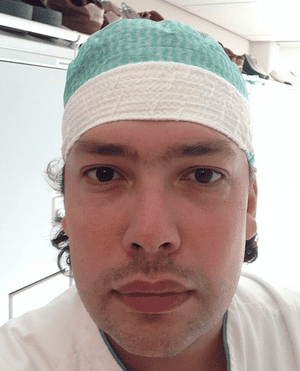Imagine you’re a doctor in Swindon and a patient with a chewing tobacco habit turns up with unusual tongue lesions. What if you could, at the press of a few buttons, locate and get instant advice from the Mumbai-based world expert on cancers related to chewing tobacco?
This is the vision for a new app which aims to transform the way in which 8.5 million doctors around the world share their knowledge and skills.
MDLinking – an expert directory, instant messaging service and video source – began trialling a beta version for iPhones in May this year and aims to launch its full Apple and Android versions before 2017.
The Dutch startup, which has €2.5m of seed funding, has several hundred testers in the Netherlands, 4,000 registered doctors so far and is in talks with organisations including Médecins Sans Frontièresand the Aga Khan Development Network (AKDN) about using its free software.
“The original idea was that if doctors worldwide connect with each other and share knowledge, healthcare will improve on a global level” says Alec Behrens, co-founder of Booking.com and founding partner of MDLinking.
Instant messaging
Many doctors are already using instant messaging tools to discuss patient cases. A 2015 survey found more than 30% of doctors surveyed said they were sending patient related information over services such as WhatsApp.
Vascular surgeon Hans Flu, co-founder of MDLinking, came up with the idea for the secure healthcare network when he realised just how much his colleagues were using WhatsApp. He had privacy concerns over the app and worried about its plans to share account information with parent company Facebook.
Ultimately, however, Flu wants to find a solution to what he sees as the big problem in the medical world: communication. “If you communicate badly, the patient’s going to suffer, and this is a key element that everyone can improve. This is a tool developed by medical doctors, for medical doctors, that is free.”
As well as being a directory and secure instant messaging tool (it only accepts vetted medical professionals), the start-up is using virtual reality technology to record operations from multiple viewpoints, to form an interactive teaching tool – especially for countries where operating theatres are scarce.

Gijs Walraven, director for health at AKDN – which operates a non-profit, private healthcare system in developing world communities – is interested in collaborating with the MDLinking tool.
“AKDN’s work in health is mainly in sub-Saharan Africa, central and south Asia,” he says. “In these countries, there are fewer medical doctors and they have much more limited opportunities to consult with colleagues on difficult cases as well as to [access] education. New ways to interact at a distance and in a secure manner could play a very important role to improve this.
“Learning new operating techniques and how to better diagnose using the innovative video techniques that MDLinking is developing could be a real breakthrough.” And it works both ways, he says: “Healthcare providers in rural settings in Afghanistan have knowledge and skills that could be beneficial to health practitioners in London.”
Teaching by virtual reality
Dr Gijs van Acker, a surgeon at Medisch Centrum Haaglanden hospital in the Netherlands, first created teaching videos for his vascular surgery website a decade ago. “One of my residents was Hans Flu, and when he started MDLinking I said, ‘You need something that’s educational’. We wanted to make something more intuitive than 2D films,” he says.
They came up with virtual reality combined with the view-selection interface, allowing users to flick to different sections of the operation. Traditional teaching methods can’t compete, according to van Acker, who says that dead body tissue loses its colour, so isn’t the same teaching experience, while students observing actual operations are often distracted by nerves.
He has recorded four 3D operations for MDLinking so far and – thanks to a partnership providing Samsung equipment – these are viewable via mobiles and virtual reality headsets.
As the app is free, the business plans to raise revenue by broadcasting sponsored medical conference content and acting as a recruitment site for international medical placements. It wants to establish video centres in different places around the world using tools and facilities available there – for example, treating appendicitis in remote Africa.
Kiran Jobanputra, deputy head of the Manson Unit at Médecins Sans Frontières in London, says the organisation is looking into MDLinking as it develops a medical IT strategy. “Until something is piloted and evaluated, it is hard to say, but I do see potential in this app,” he says. “Having been a field doctor, I came up against huge difficulty getting access to information, particularly relevant technical advice.”
He says MSF medical experts at the London HQ and its telemedicine platform have time, context and connectivity limitations. “MSF clinicians are using WhatsApp groups of colleagues to get rapid, relevant advice – although it’s not an official MSF tool, and some people in the organisation might not agree with it,” he says. “That MDLinking ‘LinkedIn’ function to join or create a new group of people happy to give their opinion, with regional experience, has huge potential.
“I suspect the educational content will still require connectivity of too high bandwidth. We’re not testing MDLinking at the moment but if it comes on to Android, which is the main smartphone operating system in the contexts we work in, we probably will.
“The sharing economy isn’t new – in our medical studies we are taught ‘see one, do one, teach one’ – but barriers to sharing information are getting lower.”
From Dutch hospital to Afghan clinic: new VR app aims to link 8.5m doctors
Hiç yorum yok:
Yorum Gönder